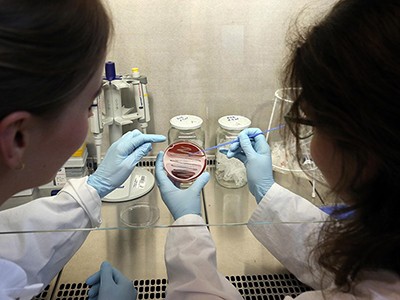Bullying is endemic in academia, an environment riddled with hierarchies and hyper-competition, exacerbated by an over-reliance on temporary contracts and the pressure to land highly coveted tenured positions.
To give a sense of the size of the problem, in any 12-month period, on average, 25% of faculty members self-identify as being bullied, while 40–50% say they have witnessed others being bullied, according to a synthesis of studies published in 2019 (L. Keashly in Special Topics and Particular Occupations, Professions and Sectors (eds P. D’Cruz et al.) https://doi.org/gbgn; Springer, 2019).
A survey that year of 9,000 staff at the Max Planck Society, the German research organization, found that 10% had experienced bullying behaviour in the past 12 months, and 17.5% reported bullying events over a longer time frame (see Nature 571, 14–15; 2019). One in five of the graduate students who responded to Nature’s 2019 global PhD survey reported experiencing bullying, and 57% of those reported feeling unable to discuss their situation without fear of personal repercussions (see Nature 575, 403–406; 2019).
As universities around the world grapple with pandemic-related stressors, including cutbacks, layoffs and furloughs, an environment could emerge in which bullying behaviours increase, says Loraleigh Keashly, a researcher at Wayne State University in Detroit, Michigan, who studies academic bullying.
A 2020 paper that she co-authored with Morteza Mahmoudi, a nanotechnologist at Michigan State University in East Lansing, suggests that the pandemic could fuel abusive academic-workplace behaviours owing to worsening psychological health and economic and social inequities (M. Mahmoudi and L. Keashly Bioimpacts 10, 139–140; 2020).
Mahmoudi is co-founder and director of the Academic Parity Movement, a global initiative that aims to document bullying and increase legal protections for bullied researchers. It defines bullying by an academic superior as “sustained hostile behaviour … including, but not limited to, ridiculing, threatening, blaming, invasion of privacy, [and] put-downs”. The definition also includes “interference with matriculation and career progress”, such as “removing funding, writing falsely negative recommendation letters, taking credit for others’ work and threatening to cancel visas or fellowships”.
In what follows, Keashly and Mahmoudi, along with six other higher-education professionals who research bullying in academia, tell Nature about some of the options available to those who are faced with a bullying supervisor, and how researchers can protect their careers and mental well-being in the process. They also outline how universities are putting in place policies and reporting procedures — often despite the absence of national laws to offer protection from workplace bullying.
Finally, a researcher who complained about a PhD supervisor’s bullying behaviour towards him and others at a university in Australia describes his experience and the toll it took. Because of the sensitivity surrounding his situation, Nature is not revealing his identity.
Here is a step-by-step approach to confronting an academic bully.
Step 1: Confirm that it is bullying
In 2016, the PhD student mentioned above witnessed his adviser’s extreme response to a fellow graduate student. Two years later, he himself was the focus of his supervisor’s ire. The abuse “was always for little mistakes — for example, submitting a paper to a journal with a typo”, he says. It was always disproportionate, including yelling, ostracization and threats, such as removing his name from the authorship of a paper or discontinuing supervision, he adds.
He says that the experience of being bullied caused a mental breakdown, and led to the collapse of his personal relationship because of the stress it caused.
But bullying is not always clear-cut, and Keashly stresses that it does not include negative comments delivered appropriately in a performance evaluation.
“You need to make sure at the first stage that what you are experiencing is academic bullying, and that it’s not a misunderstanding or something that will fall into the academic-freedom realm,” says Mahmoudi. The key difference is that academics should be free to criticize ideas, he says, but without fear or threat of retaliation or consequences.
To make sense of any untoward behaviour, the two researchers recommend documenting any and all instances of it. “Bullying often starts off quite subtly and, if unaddressed, can escalate over time,” says Keashly.
The target of a bully should write down what happened, how they felt about it, how they responded, and anything else going on at the time, she says. “Having records helps the recipient get a sense as to whether this is an aberration or if it is becoming established as a pattern,” she says. Furthermore, says Mahmoudi, “academic bullies are clever; they can leave no trace”.
Step 2: Seek support
Keashly encourages those who have been bullied to check their institution’s formal policies and procedures for raising concerns about hostile, unfair treatment. This can be done either by asking human-resources colleagues or by checking the university website to see whether there are workplace discrimination, harassment or anti-bullying policies in place.
Leah Hollis, a workplace-bullying researcher based at Rutgers University in New Brunswick, New Jersey, recommends checking whether the institution has a grievance policy or faculty senate (or similar faculty governing body) that can offer support to those who have been bullied. Unions can also offer advice, she adds.
Another important step is to consult with the university’s ombudsman or an equivalent office, says Mahmoudi. These offices exist at most large research institutions, in the United States and around the world, to offer an informal, impartial and confidential conflict-management service that operates independently of the university. “Nothing will be leaked to your PI [principal investigator] or department; you are ensured confidentiality,” he says of these offices.
Most UK institutions have established complaint procedures or mediation services. If university-based options don’t satisfy, students in England and Wales can take their concerns to the Office of the Independent Adjudicator. It addresses unresolved complaints, including those to do with bullying, harassment and discrimination.
Beyond university anti-bullying and grievance policies, some countries have introduced legislation aimed at tackling the issue. In France, for example, a labour code put in place by the 2002 Social Modernization Act protects employees from bullying or harassment that intentionally or unintentionally degrades their working conditions, violates their rights and dignity, impairs their physical or mental health, or jeopardizes their professional future.
Still, when asked whether academics in France are better protected from workplace bullying, Loïc Lerouge, a labour-law researcher at the University of Bordeaux, France, says: “On paper, yes; in practice, no.”
“People don’t always trust the procedures,” says Christina Björklund, a researcher at the Karolinska Institute in Stockholm who studies workplace bullying. It is still quite rare for bullies to be held accountable for their behaviour, she says. The Swedish government has asked Björklund and colleagues to develop evidence-based guidelines for all workplaces.
“Bullying is about power,” she adds. “If you choose to report it, it will be tough and will take a lot of your energy.”
To that end, says Hollis, victims need to build a support community, which could include peers and family members, with whom to share what happened and how it made the bullying target feel. “Find your allies first,” she advises. There’s no shame in talking to a mental-health counsellor, she adds. “Always remember: it’s not your fault.”
Step 3: Consider informal and formal complaint routes
Following a spate of high-profile investigations at prominent institutions (see Nature 563, 616–618; 2018), a growing number of universities, mindful of the financial and reputational cost of bullying, are introducing reporting mechanisms alongside anti-bullying policies.
Alexandra Olaya-Castro, vice-dean for equality, diversity and inclusion in the faculty of mathematical and physical sciences at University College London (UCL), says her institution established a ‘Report + Support’ tool in 2019. It walks users through both informal and formal resolution processes for addressing bullying claims, and allows problems to be reported anonymously.
Olaya-Castro encourages people to go on the record through university channels, because anonymous reports can only help to address prevention and intervention university-wide; taking action to address an individual’s behaviour requires the target to report it through a formal or informal process, which requires details. Complainants need to report their grievances to the right people, she adds.
UCL has three informal resolution processes. The first involves mediation, in the form of a facilitated discussion between the target and the bully, says Olaya-Castro. The second option calls on a senior member of staff to explain to the bully why their behaviour is unacceptable.
Finally, if the target of a bullying supervisor doesn’t want to involve anyone in the department, they can speak to a designated dignity adviser, she adds. These are volunteers among campus employees who are trained to offer confidential support on matters of bullying, harassment and sexual misconduct. An informal resolution can work well if bullying is confronted early, she says.
If mediation doesn’t resolve the concern, a formal procedure might follow at UCL, or at other institutions where similar processes are in place. A preliminary investigation, typically conducted by human-resources staff, would aim to establish whether there are grounds for the complaint, as a way to weed out baseless accusations.
If there are grounds, a formal hearing is then scheduled. At UCL, this would involve a grievance panel; Human Resources and the head of department appoint one manager, one trade-union representative and a senior member of staff who will chair the proceedings. If the target of the bullying accepts the outcome, that’s the end of it; if not, they have the option to appeal. “It is not an easy process — either the formal or informal paths,” says Olaya-Castro of reporting at UCL or elsewhere. But reaching an informal resolution can be preferable because it consumes less time and energy for all involved, she adds, while acknowledging that unfortunately, “some situations require a formal procedure”.
Keashly says the processes at UCL are similar to those at many institutions, but she also encourages faculty members to keep one another’s unacceptable behaviours in check Most importantly, she says, they should challenge narratives that enable bullying — such as ‘that’s just the way he is’ or ‘smart people are just abrasive’.
The anonymous PhD student says the investigation of his case dragged on for 12 months as the university repeatedly delayed its responses. It took the university a week to respond to his e-mails, a month to schedule his first interview, and there were two extensions to the deadline for publishing the investigation’s final report. In the middle of the process, he was told that any outcome or punishment would be kept between the university and his supervisor.
“I want to encourage targets to report bullying, but the system is so fraught, reporting can perpetuate the harm if the university is not equipped to protect people,” says Erika Marín-Spiotta, a biogeographer at the University of Wisconsin–Madison and recipient of a US National Science Foundation grant to conduct bystander training. The training offers safe intervention strategies to protect and support targets of bullying or harassment. Keashly highlights the ‘four D’s’ of bystanding: distract the bully or target to defuse the situation; directly engage the bully; delegate to someone, for example, in a position of authority, who can offer help; and delay an offer of support if you can’t intervene there and then.
Step 4: Know what to expect after filing a complaint
As soon as someone lodges a formal complaint, everything changes, says Mahmoudi. It’s a decision that requires a good deal of consideration, and people should think about how strong their support network is and their personal fortitude before deciding whether to go through what will probably be a gruelling experience.
Hollis recommends that the targets of bullying ask their informal network or a trusted faculty member how their institution has responded to others’ complaints, to know what might await them if they file a formal complaint themselves. Some universities, she says, want the problem to go away more than they want to listen to the people who have been bullied, adding: “It really depends on how the organization has responded before.” She also cautions that a supervisor accused of bullying might go after the complainant after a report has been filed. Mahmoudi says it’s not uncommon for some institutions to use delaying tactics in the hope that a complainant will drop their accusation.
Saman Hosseinpour, a materials scientist at the Friedrich Alexander University in Erlangen, Germany, and an Academic Parity Movement advisory-board member, notes that universities’ support for the targets of bullying can often be lacklustre, because the institution wants the least disruptive resolution possible. And, often, the bully has more power and clout, and brings desirable resources to the university. For example, Hosseinpour adds, if a target opts for mediation, mediators might try to persuade them that academia is simply a tough environment, and that everyone faces issues similar to what they went through.
Mahmoudi has amassed 2,000 responses to a survey about satisfaction with investigations of bullying. Only 7% reported that they experienced a fair and unbiased process, he says of his as-yet unpublished work. “International students will have a much rougher time than national ones,” he says, given that their PI might have the power to cancel their appointment, which could impact their visa status, and they might find it hard to access support resources because of cultural or language barriers.
Still, if a university has policies and procedures around bullying, Keashly says, it is legally obligated to follow them, including taking appropriate action in the event that charges of bullying are confirmed. And the more policies and procedures there are, the greater the recognition that this is a significant problem, she adds.
The anonymous PhD student feels that his university had a greater incentive to support a high-profile faculty member — who brought in multimillion-dollar grants — than a PhD student. Ultimately, he left the institution and, after setting into a new role, filed a formal complaint. If he had it to do again, he says would have come forward two years before he did. Targets “are afraid because they perceive that bullies have more power over them than they [actually] do”, he says. “Life’s too short. The best thing,” he says, is to “move on as fast as you can”.
Despite the emergence of reporting mechanisms, policies and intervention training, the targets of bullying often remain reluctant to report abuse for fear of retaliation that could jeopardize their careers.
Mahmoudi advises the targets of bullying to formulate a back-up plan. This can include leaving a toxic working environment and seeking employment elsewhere.
Keashly advises that it’s not an either/or choice. “You can leave an organization and still continue to address the issue,” she says, through an exit interview — which many institutions offer before an employee leaves — a formal complaint process or lawsuit, depending on what is appropriate.
"how" - Google News
May 11, 2021 at 05:32PM
https://ift.tt/33vwZnb
How to blow the whistle on an academic bully - Nature.com
"how" - Google News
https://ift.tt/2MfXd3I
Bagikan Berita Ini




















0 Response to "How to blow the whistle on an academic bully - Nature.com"
Post a Comment